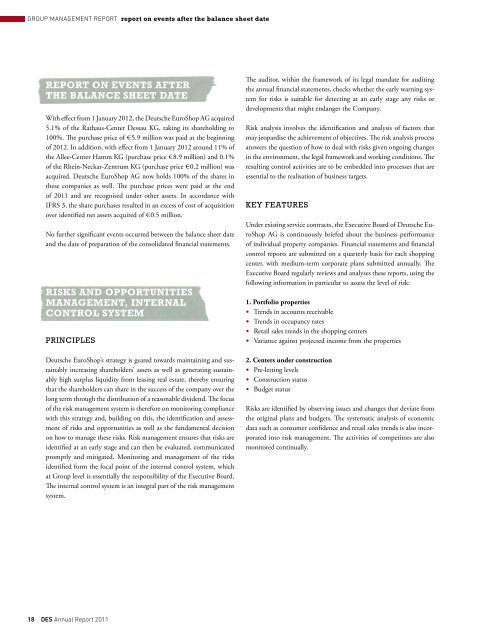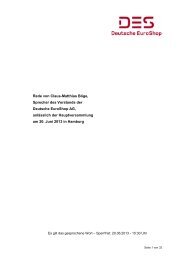Financials - Deutsche EuroShop
Financials - Deutsche EuroShop
Financials - Deutsche EuroShop
You also want an ePaper? Increase the reach of your titles
YUMPU automatically turns print PDFs into web optimized ePapers that Google loves.
GRoup MAnAGeMent RepoRt report on events after the balance sheet date<br />
report on events after<br />
the balanCe sheet date<br />
With effect from 1 January 2012, the <strong>Deutsche</strong> <strong>EuroShop</strong> AG acquired<br />
5.1% of the Rathaus-Center Dessau KG, taking its shareholding to<br />
100%. The purchase price of € 5.9 million was paid at the beginning<br />
of 2012. In addition, with effect from 1 January 2012 around 11% of<br />
the Allee-Center Hamm KG (purchase price € 8.9 million) and 0.1%<br />
of the Rhein-Neckar-Zentrum KG (purchase price € 0.2 million) was<br />
acquired. <strong>Deutsche</strong> <strong>EuroShop</strong> AG now holds 100% of the shares in<br />
these companies as well. The purchase prices were paid at the end<br />
of 2011 and are recognised under other assets. In accordance with<br />
IFRS 3, the share purchases resulted in an excess of cost of acquisition<br />
over identified net assets acquired of € 0.5 million.<br />
No further significant events occurred between the balance sheet date<br />
and the date of preparation of the consolidated financial statements.<br />
risks and opportunities<br />
management, internal<br />
Control system<br />
pRINCIplES<br />
<strong>Deutsche</strong> <strong>EuroShop</strong>’s strategy is geared towards maintaining and sustainably<br />
increasing shareholders’ assets as well as generating sustainably<br />
high surplus liquidity from leasing real estate, thereby ensuring<br />
that the shareholders can share in the success of the company over the<br />
long term through the distribution of a reasonable dividend. The focus<br />
of the risk management system is therefore on monitoring compliance<br />
with this strategy and, building on this, the identification and assessment<br />
of risks and opportunities as well as the fundamental decision<br />
on how to manage these risks. Risk management ensures that risks are<br />
identified at an early stage and can then be evaluated, communicated<br />
promptly and mitigated. Monitoring and management of the risks<br />
identified form the focal point of the internal control system, which<br />
at Group level is essentially the responsibility of the Executive Board.<br />
The internal control system is an integral part of the risk management<br />
system.<br />
18 Des Annual Report 2011<br />
The auditor, within the framework of its legal mandate for auditing<br />
the annual financial statements, checks whether the early warning system<br />
for risks is suitable for detecting at an early stage any risks or<br />
developments that might endanger the Company.<br />
Risk analysis involves the identification and analysis of factors that<br />
may jeopardise the achievement of objectives. The risk analysis process<br />
answers the question of how to deal with risks given ongoing changes<br />
in the environment, the legal framework and working conditions. The<br />
resulting control activities are to be embedded into processes that are<br />
essential to the realisation of business targets.<br />
KEY FEaTuRES<br />
Under existing service contracts, the Executive Board of <strong>Deutsche</strong> <strong>EuroShop</strong><br />
AG is continuously briefed about the business performance<br />
of individual property companies. Financial statements and financial<br />
control reports are submitted on a quarterly basis for each shopping<br />
center, with medium-term corporate plans submitted annually. The<br />
Executive Board regularly reviews and analyses these reports, using the<br />
following information in particular to assess the level of risk:<br />
1. Portfolio properties<br />
• Trends in accounts receivable<br />
• Trends in occupancy rates<br />
• Retail sales trends in the shopping centers<br />
• Variance against projected income from the properties<br />
2. Centers under construction<br />
• Pre-letting levels<br />
• Construction status<br />
• Budget status<br />
Risks are identified by observing issues and changes that deviate from<br />
the original plans and budgets. The systematic analysis of economic<br />
data such as consumer confidence and retail sales trends is also incorporated<br />
into risk management. The activities of competitors are also<br />
monitored continually.





